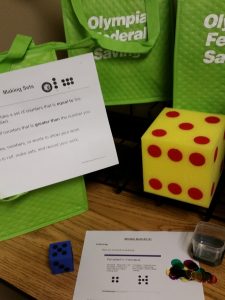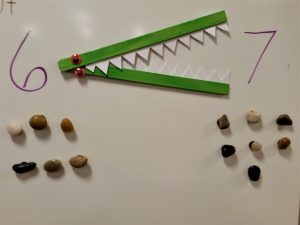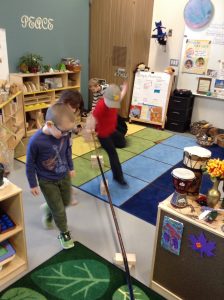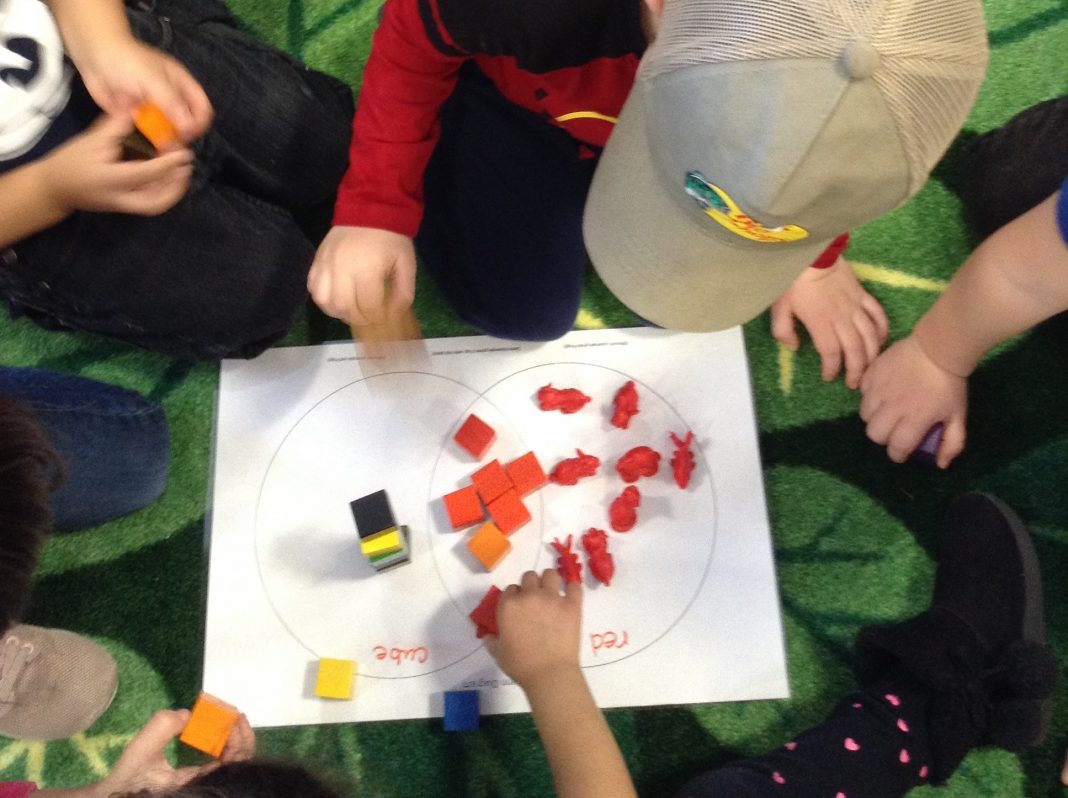Every month a special kit is delivered to each of the Sound to Harbor Early Learning Programs Classrooms throughout the region. The monthly math kit, an exciting surprise for the whole classroom, comes filled with games and ideas to supplement the regular math curriculum. The monthly math kits are one of the ways Sound to Harbor is supporting preschool students to succeed by helping them build strong math foundations.

What kind of math can a three- to five-year-old learn? A lot, actually. Everything they do involves math. Much of their play centered learning is filled with math concepts. The teachers and teacher assistants (TAs), support the students by recognizing the math in their play. Then, they help them connect the play to math concepts and vocabulary, giving the students a strong mathematics foundation for their future learning.
Simple block building structures are an opportunity to teach words like symmetrical. Counting and arithmetic are built into simple tasks and chores like setting places at a table. There are so many opportunities in early learning for children to explore math, but sometimes it’s fun to add new things into the mix. That’s where the monthly math kits come in.
Every month, Early Childhood Education (ECE) Instructional Coaches Holly Porter, Avis Shrestha and Michelle Thurman, build 35 kits, one for each classroom across the Sound to Harbor District. Each kit focuses on one specific theme or idea which has a basis in math, such as sorting, patterns, measurements, counting and arithmetic, and geometry. The math kits also include games that often fit well with popular children’s stories.
However, though the monthly math kits are focused around math concepts, the learning attached to them is much more comprehensive. Students build on their language and vocabulary skills with the kits. Using manipulatives like Unit blocks and Magna-tiles help students visualize math, and also improve their fine motor skills. Many of the kits blend in physical science and engineering to help students see practical applications of the math concepts. And across all the kits, students are working together, problem solving, cooperating, and sharing, which helps them build their social skills.

Many items in the math kits are hand created by Porter, Shrestha and Thurman, sometimes with the help of TAs. This year, the TAs are benefiting from STEAM (Science, Technology, Engineering, Art, and Math) training, so math has been a big part of that. During part of their training, together they built less/more alligators, a simple tool which can be used to help children understand the concept of the greater than (>) and less than (<) math symbols. The tool is simply two pieces of wood attached at a 35-degree angle, with foam teeth and googly eyes. Magnets may be affixed to the back so the tool can attach to a white board.
Some items are specially purchased when they fit into the curriculum, like Tiny Polka Dot, an award-winning math game created by Olympia native mathematician, Dan Finkle, founder of Math for Love. The TAs got to play with Tiny Polka Dot cards during one of their STEAM trainings. “So, when we brought Tiny Polka Dot into the classroom, the TAs were the experts,” says Thurman, “which really empowered them to have a more active role in classroom.”

Along with activities and games, the monthly math kit includes flyers to send home to families, so students can continue their math learning at home. The flyers help parents recreate games and activities from the classroom with everyday items found around the house, like buttons and muffin tins. It also gives ideas about how math concepts could be applied to household chores like setting the table, or sorting socks when doing laundry.
“We have some teachers and TAs that didn’t really feel successful with math when they were younger,” says Porter. “So, part of our job as coaches is to help the educators see how fun math can be, as they are showing students how much fun math is.”
In addition to the monthly math kits, the three ECE instructional coaches keep an eye out for other learning and enrichment opportunities that will benefit teachers and students. Three teachers in Sound to Harbor are currently getting additional math support in their classrooms from the Cultivate Learning program through the University of Washington. In coordination with the ECE instructional coaches, three teachers applied and were accepted to a STEAM trunk math study, which provides additional enrichment kits to the classroom.
Looking at Sound to Harbor’s monthly math kits, filled with playdoh for building marble ramps, hungry alligator less/more tools, and color mixing wells with pipettes and water colors, math is starting to look like a lot more fun.
Sound to Harbor Early Learning Programs
Capital Region ESD 113
6005 Tyee Drive SW, Tumwater
360-464-6800
Sponsored





















































